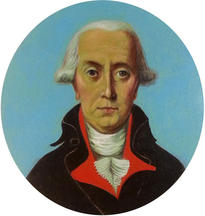
The Teaching Guide for the Equal Justice Under Law series stated that John Marshall and Thomas Jefferson disagreed over many issues including The Mazzei letter, in which Jefferson maligned George Washington.1 However, in the letter Jefferson did not attack Washington by name he attacked the Federalist party and the government; which under the United States Constitution was his right.2 The original letter was private, not meant for publication. The offending passage which was not even the full paragraph was published without his knowledge or consent.3 First in France and then in many newspapers in the United States. Even in the published version, printed in a New York newspaper, Washington is not mentioned by name.4
The commentary was only tangentially related to the passage and provides no insight into the meaning of the passage. Furthermore, the Executive Branch of the government is more than just the president. Jefferson more than likely was not referring to Washington with the phrases “all officers of the government…” and “all timid men who prefer the calm of despotism to the boisterous sea of liberty…”.5
Many words can be used to describe George Washington timid is not among them. Washington was not a Federalist. In fact, he was against political parties, or factions as he referred to them. That was why Alexander Hamilton was considered the leader of the Federalist party. Washington was held apart from his cabinet and the other officers in the Executive Branch. While Jefferson maligned Hamilton and other federalist cabinet members, he certainly would not have maligned Washington. Federalists commonly interpreted the letter as a thinly veiled attack against Washington, but they would, wouldn’t they. That’s what political parties do.6
It was clear that John Marshall and Thomas Jefferson had “deep-rooted philosophical differences,” and were “members of opposing political parties with often irreconcilable positions.7 But, John Marshall was far from a party ideologue. Marshall voted against the Federalist party on several occasions.8 Furthermore, his dislike of Jefferson did not cause Marshall to support Burr in the presidential election of 1800. In fact, he did not use his influence to support Jefferson either. Marshall took Alexander Hamilton at his word regarding Aaron Burr’s character. Marshall made clear while he could not support Jefferson, he was less dangerous than Burr. In that same letter to Alexander Hamilton, Marshall made only one reference to the Mazzei letter stating, “the morals of the Author of the letter to Mazzei cannot be pure.”9
That phrase comes at the end of a paragraph in which Marshall explains to Hamilton his opinion of Thomas Jefferson, which is negative. Nevertheless, if the letter was a major irreconcilable issue between them why doesn’t Marshall clearly name Jefferson as a person of impure morals, instead of the word author? In any case, Marshall and Jefferson’s adversarial relationship had been clearly established. Referring to the letter introduced an unnecessary and confusing item into an unrelated complex event. It should have been removed.
Notes
1Equal Justice Under Law Teaching Guide, (Judicial Conference of the United States, 1976): 20, http://bit.ly/EJULTeachingGuideB.
2 “Thomas Jefferson to Philip Mazzei,” The Papers of Thomas Jefferson, Volume 29: 1 March 1796 to 31 December 1797 (Princeton University Press, 2002), 81-83, accessed June 22, 2017, https://jeffersonpapers.princeton.edu/selected-documents/thomas-jefferson-philip-mazzei-0.
3 “Jefferson’s Letter to Philip Mazzei,” Editorial Note The Papers of Thomas Jefferson, Volume 29: 1 March 1796 to 31 December 1797 (Princeton University Press, 2002), 73-88, accessed June 22, 2017, https://jeffersonpapers.princeton.edu/selected-documents/jeffersons-letter-philip-mazzei
4 “Extract and Commentary Printed in the New York Minerva,” The Papers of Thomas Jefferson, Volume 29: 1 March 1796 to 31 December 1797 (Princeton University Press, 2002), 86-87, accessed June 22, 2017, https://jeffersonpapers.princeton.edu/selected-documents/extract-and-commentary-printed-new-york-minerva
5 “Thomas Jefferson to Philip Mazzei”; “Extract and Commentary Printed in the New York Minerva.”
6 “Jefferson’s Letter to Philip Mazzei,” Editorial Note.
7Equal Justice Under Law Teaching Guide, 20.
8 Harold H. Burton, “John Marshall. The Man,” University of Pennsylvania Law Review, 104.1 (October 1955): 5.
9 “To Alexander Hamilton from John Marshall, 1 January 1801,” Founders Online, National Archives, last modified March 30, 2017, http://founders.archives.gov/documents/Hamilton/01-25-02-0154. [Original source: The Papers of Alexander Hamilton, vol. 25, July 1800 – April 1802, ed. Harold C. Syrett. New York: Columbia University Press, 1977, pp. 290–292.]
